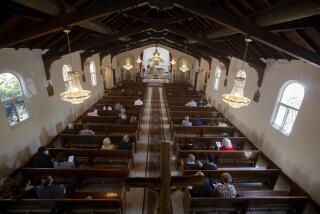PLATFORM : Churchgoers Don’t Have a Monopoly on Morality
- Share via
There is absolutely no evidence that atheists, agnostics and just plain non- believers are any less ethical or have a weaker sense of morality than believers, yet we are treated as if we are the devil incarnate. In fact, people like myself who are nonbelievers hold ourselves to a more stringent and more difficult moral code than believers.
I consider myself a highly spiritual person, even though I don’t believe in God. I believe that I am connected to all living beings on this Earth and must treat them with care. Because we nonbelievers do not have a deity who hands us a list of ethical do’s and don’ts, we have to develop our own moral code based on human needs and human understandings. When we commit a wrong, as defined by society, we cannot run to a priest for absolution but must wrestle with our own conscience.
We hold ourselves to the highest standards of morality because we understand that any act we commit that impacts on others has consequences for which we alone as humans must answer. We do not have the luxury of throwing ourselves on the mercy of some supreme being and asking for forgiveness. We alone must bear the burden, no matter how heavy.
This hardly is an ethics for the faint of heart.
History demonstrates that belief in a god does little to inhibit immoral acts. Criminals, rapists, child-abusers and spouse-batterers are often churchgoers.
I applaud the courage of the Randall family in standing up for their belief system. All those true believers out there might begin to practice a little more so-called Christian love and charity.
More to Read
Sign up for Essential California
The most important California stories and recommendations in your inbox every morning.
You may occasionally receive promotional content from the Los Angeles Times.












